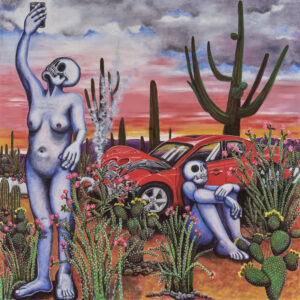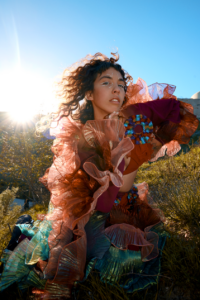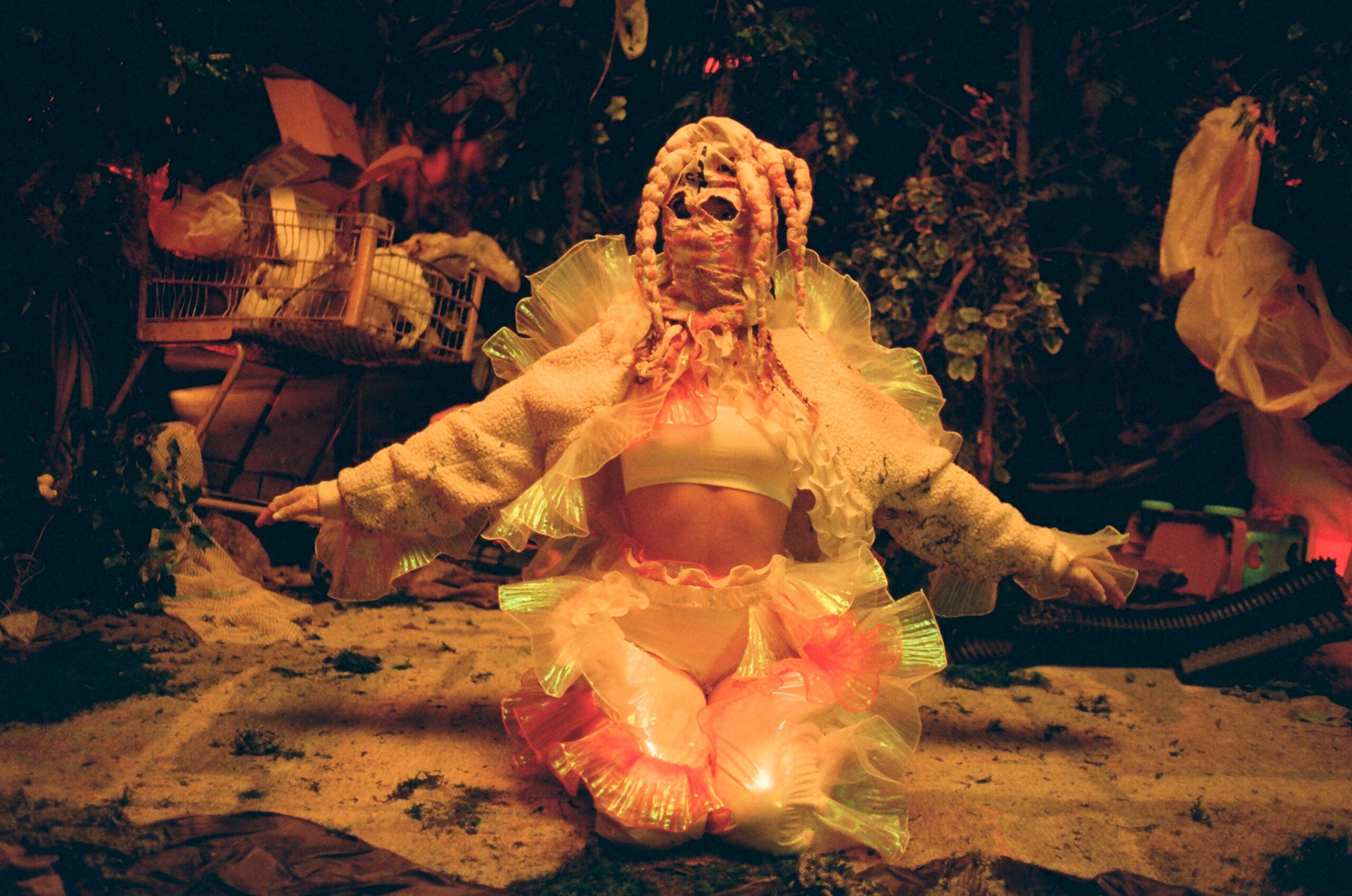Foto-© Eli Freireich
Mit All of This Will End veröffentlichte die US-amerikanische Songwriterin Indigo De Souza am vergangenen Freitag den Nachfolger ihres gefeierten Durchbruchsalbums Any Shape You Take (2021, u.a. Album des Monats im Musikexpress). Es ist ein Statement darüber, sich furchtlos von der Vergangenheit in eine von Dankbarkeit geprägte Gegenwart zu bewegen, alles bei jedem Schritt zu fühlen und sich dafür zu entscheiden, liebevolles Bewusstsein zu verkörpern. Die 11 Songs des Albums sind ein raues und radikal optimistisches Werk, das sich mit der Sterblichkeit, der Verjüngung durch die Gemeinschaft und der Wichtigkeit, sich im Jetzt zu zentrieren, auseinandersetzt. Die Tracks stammen aus den eindringlichsten Momenten ihres Lebens: Kindheitserinnerungen, das Sammeln auf Parkplätzen, die ekstatischen Reisen, die sie mit Freunden in den Bergen der Appalachen und den Sümpfen des Südens verbrachte, und die Zeiten, in denen sie für sich selbst einstehen musste. Wir sprachen mit Indigo via Zoom über ihr neues Album, ihre Einflüsse, Lieblingsbeschäftigungen neben der Musik und vieles mehr – das Interview könnt ihr übrigens auch in unserem neuen Podcast The Space Between the Notes anhören!
 Indigo, welcome! Thanks for talking to me.
Indigo, welcome! Thanks for talking to me.
Thank you!
When I first listened to All of This Will End, I figured because of the title that it was going to be a pessimistic album. Actually this is a record about taking stock of when you’re happy. You’ve said up until recently that your life felt pretty chaotic and you’ve now moved on from that. Can you start by describing what it felt like for you creatively to realize that the things that you’d been writing songs about for a while were no longer charged in the same way, and that you had to take a new stance on songwriting.
Yeah, it was kind of a crazy thing. I think a lot of it had to do with the pandemic. The pandemic feels like kind of a touchy thing to talk about sometimes, but, as horrible as it was for that shift to take place in the world, it also caused a very large shift within myself for a lot of reasons. It was basically just like we were all just staying in our lanes and going to work and doing all the things that we normally do. And the world was just fucked up. And it always has been and we’re just used to that and we just kind of let it happen the way it was happening. And then suddenly this thing happened that we didn’t expect and it kind of shook everything and caused the landscape to change completely. It did a lot of things. It caused me to feel more inward and to do a lot of reflecting, and it gave me the time to do that and the rest and space to do that. Also it caused everyone around me to kind of do the same. I watched people kind of turn from things that they didn’t care about as much towards things that they actually feel really passionate about. Or away from people that they don’t love very much towards people that they really want to spend their time with and really feel precious about. I think just something that came from that period of time was a clarity towards things that are important and an understanding of where I wanted to put my intention. Because of that, life suddenly started to feel a lot more doable for me personally because before that, I had felt like everyone was sleepwalking around and I felt really lonely in the messed up-ness of it all and really felt sad that nothing seemingly was ever going to happen to wake people up to that. The world is so hard to be a part of, and everyone is constantly struggling in many different ways to keep up with the emotional turmoil of being a human, but also the fact that we have to try to survive in a place that like, especially in America, a place that is fully about commercialism and money and drive to work harder and make it to the top of the ladder and have all the things that might cause you to feel happy and comforted, like a home and basic essential needs for staying alive. I think it was just a moment when everything wass kind of standing still. Some people were really uncomfortable with that reflection. Some people, I think, really thrived in it because of that moment that we got to rest and kind of look at it all and see what it had been for so long. So it caused me to write a lot of songs. I wrote like most of this album during that time when the pandemic was very much in flow and I was living alone at the time and I was pretty freaked out by the world, but also was starting to meet other people who felt the same as me. It forced me into meeting people that were spending more time in nature than anything else because it felt safer than hanging out with people inside. That was the gateway into a new pattern of community that has kind of saved my life. And so, yeah, a lot of the songs really just came from reflecting on past things that were really hurtful but aren’t really a part of my life anymore.
Can you set the scene a little bit for, for what it’s like when you work on a song? What does that space look like? What tools are you using and how do you build up the elements? I know that when you go into the studio, your guitarist Dexter Webb and your drummer Avery Sullivan get involved with arrangements and stuff. But I’d like to hear about the earlier stages, the pre-studio part and your writing in solitude.
Yeah, it’s so funny because people ask that a lot in interviews, and I kind of try to conjure up the image of when I wrote the songs. A lot of times I can’t remember anything about it because it’s almost like a blackout feeling in a way. Since I was nine years old, I’ve been writing songs and recently I was helping my mom clean out her house because she moved from my childhood house to another house, and she’s leaving that one behind. I found all these notes and journals and songs that I’d been writing when I was really little. It was something that I just have always done as almost like a way of journaling and reflecting. Honestly, when I was young, I didn’t really have many friends and was very lonely and really depressed. Even from the time that I was like nine years old, I was writing a lot of stuff incredibly similar to what I write now, just questioning existence, feeling like I don’t really know why I need to be here or questioning a lot of stuff about death. Yeah. So I think it’s such an innate thing, a tool for processing emotion that it’s hard to even really put into words what it feels like. But I guess the songs that normally end up on records are the ones that kind of just come down through whatever tube they come from and are just already a song. Whereas if there’s something that I’m working on that I have to really work on over and over again, I’m just trying and trying, trying to get it to be a song that normally isn’t my favorite song. Ones that are so effortless and it’s just like writing down a poem and then it’s there and I don’t really know why or how, it feels like magic. Those are the ones that I normally want to put on records.
 Are you taken back to that place when you sing them again, or do you think that you purge the feeling once you’ve written the song?
Are you taken back to that place when you sing them again, or do you think that you purge the feeling once you’ve written the song?
I think that when I write it, and then when it becomes a live structured thing, it becomes something totally different and it becomes more powerful in a way because it’s suddenly shared in an open space with other people. And a lot of times whatever true emotion that poured down in that moment when I wrote the song kind of exists in the room with whoever is watching. Sharing that with strangers is one of the most potent experiences, and it feels really special. I’m very grateful to be able to do that.
So I want to talk about the development in your sound. You kind of expanded your palette of sounds on All of This Will End. There’s a trumpet on the track The Water, which was a surprise. I really love that. And there’s a bunch of pedal steel and there are lots of different synth sounds. Are you making a lot of those decisions?
I just remember them, like, popping into my head and thinking it would be cool to try. This album in general just felt really playful. The more that I level up in my career, the more resources there are. And so we could get a trumpet player to come in and try to do this thing and maybe it will be good and maybe it’ll be horrible. Having that freedom is such a privilege and feels incredibly different from any other experience I’ve ever had recording. It’s feels like every time I record a new album, there’s more that’s possible. So it is just fun to play with.
You’ve always had heavier elements to some of your songs, but you really send it on this record and a couple of moments like Wasting Your Time and Always particularly get really, really heavy, which I’m a big fan of. What are your heavy influences? Do you listen to a lot of metal or hardcore?
No, I don’t listen to hardcore stuff, but I love, for example, Fontaines DC. They’re not a hardcore band, but it’s just so intense and powerful and kind of uncaring. I think that a lot of those feelings come out when I’m writing songs sometimes or when I’m creating arrangements because I have a lot of anger issues, which is really ugly and my body gets filled with really intense emotions sometimes. I’ve found that that’s like one of the best tools, is to just generate songs from that feeling instead of actually doing anything with it. There’s just a lot of darkness in there in my silly brain. My brain just feels really broken. I actually think there’s something wrong with it. I often wish that I could break it open with a scientist or something and check it out.

I’m a really big fan of the heavy stuff, so I would encourage you to pursue that further.
Yeah, we’ve definitely talked about that. Oh, and Osees is like another one of my favorite bands. They’re probably my favorite live band I’ve ever seen. I just am mesmerized by them.
People say that a lot.
Yeah, it’s definitely worth seeing them. The first show that I saw them was an indoor show, and it was like a massive pit going and that was the first time that I’d ever thrown my body around on other people’s bodies in that kind of way. It was such a release for me. It felt great. The danger of it felt great. They’re awesome. I would love to make a more hardcore record. I would love to make a more pop record. I’d love to make a record that’s just really calming music to make art to. There’s a lot of different records to make.
I also really love the mix of influences and the different kind of moments on a record that you get with something as varied as your albums. I have to ask you about Younger and Dumber, which to me is a real album closer in the slightly out of fashion ‘album’ album kind of sense. It’s definitely a standout in terms of style on the album. It’s kind of a thesis statement for the album and it gives a real shape to the record. I think 90% of the greatest closers are ballads. That’s just my take. Were you thinking about the listener when you wrote this? It comes from a really interesting, reflective place and you’re kind of talking to yourself across time. When I hear the song, I can put myself in the psychological space of both the narrator and the listener, and I think that’s a really interesting dynamic in the song. So I just wondered whether you were thinking about that at all when you wrote it, or whether it was much less cerebral than that.
That’s interesting. I definitely remember writing it as a reflection on the way that my life went, which is not special at all. I’m sure most people’s lives go this way by just the fact of being a child and kind of seeing the world with a lot of innocence and imagination and openness and then going out into the world feeling excited about it because there’s so many possibilities. But then you realize how much darkness there is and how much trash there is and how many power hungry people there are, how many creepy guys there are, how many weird drugs, things are not always as they seem. So I think for me, I remember myself as a child and how special that feeling was to feel so untouched by everything and then to go through the meat grinder and come out on the other side with so much tenderness towards the child that I used to be because of how sad that is. I think the song was just kind of a reflection on how if all of the things that happened to me hadn’t happened to me, then I wouldn’t be who I am and I wouldn’t even be writing that song. So I don’t feel angry about the way that my life went or things that have happened to me. I just feel grateful to have the awareness to reflect on it in the ways that I have and to be able to have grown from it in the ways that I have.
What’s your vote for greatest album closer?
Oh, my God. I always forget what I listen to when people ask me questions like this. Oh, God, I don’t know. I don’t know about record closer. The thing is that I don’t really think about records as records sometimes, but maybe it’s just because of the time in which I was born. I think about songs more than records. I could tell you my favorite opening song for a record is from a record called Love The Stranger by Friendship.
Oh, my God.
You know that album?
I love that album so much. Yeah. St. Bonaventure.
That song kills me. Like I just cry and cry and I’ve just been a huge champion of Friendship for a long time. I think someday the whole world is going to be listening to Friendship. But for some reason it’s having a slow start. Dan Wriggins is my favorite writer of all time.
He’s so, so brilliant. And Love The Stranger was my favorite record of last year. It’s so, so beautiful. That’s not even the best song on the record.
Yeah. It’s hard to say.
It’s between Ramekin and Ugly Little Victory.
I also really love Ride.
Oh, that’s great. Apart from music, what is the most fun thing?
I think I would have to say the most fun thing outside of music that I enjoy the most is doing art with my friends. Like all of my friends, just being in a spot. We’re all doing art nearby each other and listening to music. An art night. There’s snacks. There’s calming music. Everyone’s on the floor, everyone’s got all different kinds of art supplies, and everyone’s just making whatever their heart’s desire is.
You’re talking about, like, visual art.
Yeah.
Have you been a drawer and painter your whole life? Because your mum’s a painter, right?
Yeah. I used to draw a lot more and I actually stopped for a couple of years probably because I was really busy with music and I kind of told myself I couldn’t draw anymore, which was silly. And then I recently had a really big mushroom trip and I came out of the mushroom trip being like, “Oh, I want to draw again”. Then I just started drawing and was able to draw, which was really strange. Now I have been non-stop drawing and making paintings and sculpture and masks since then. So I’m very art driven at the moment and a lot of the merch and stuff that I’ve been putting out lately is my drawings on them.
Thanks so much Indigo!
Yeah, no problem at all.
Indigo De Souza live:
03.07.23 Berlin, Privatclub










